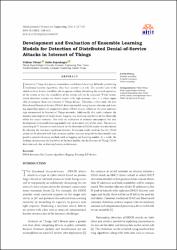| dc.contributor.author | Yılmaz, Yıldıran | |
| dc.contributor.author | Buyrukoğlu, Selim | |
| dc.date.accessioned | 2023-03-14T06:34:29Z | |
| dc.date.available | 2023-03-14T06:34:29Z | |
| dc.date.issued | 2022 | en_US |
| dc.identifier.citation | Yılmaz, Y. & Buyrukoğlu, S. (2022). Development and Evaluation of Ensemble Learning Models for Detection of Distributed Denial-of-Service Attacks in Internet of Things. Hittite Journal of Science and Engineering, 9(2), 73-82. https://doi.org/10.17350/HJSE19030000257 | en_US |
| dc.identifier.issn | 2148-4171 | |
| dc.identifier.uri | https://doi.org/10.17350/HJSE19030000257 | |
| dc.identifier.uri | https://hdl.handle.net/11436/7893 | |
| dc.description.abstract | Internet of Things that process tremendous confidential data have difficulty performing
traditional security algorithms, thus their security is at risk. The security tasks to be
added to these devices should be able to operate without disturbing the smooth operation
of the system so that the availability of the system will not be impaired. While various
attack detection systems can detect attacks with high accuracy rates, it is often impossible to integrate them into Internet of Things devices. Therefore, in this work, the new
Distributed Denial-of-Service (DDoS) detection models using feature selection and learning algorithms jointly are proposed to detect DDoS attacks, which are the most common
type encountered by Internet of Things networks. Additionally, this study evaluates the
memory consumption of single-based, bagging, and boosting algorithms on the client-side
which has scarce resources. Not only the evaluation of memory consumption but also
development of ensemble learning models refer to the novel part of this study. The data set
consisting of 79 features in total created for the detection of DDoS attacks was minimized
by selecting the two most significant features. Evaluation results confirm that the DDoS
attack can be detected with high accuracy and less memory usage by the base models compared to complex learning methods such as bagging and boosting models. As a result, the
findings demonstrate the feasibility of the base models, for the Internet of Things DDoS
detection task, due to their application performance. | en_US |
| dc.language.iso | eng | en_US |
| dc.publisher | Hitit University | en_US |
| dc.rights | info:eu-repo/semantics/openAccess | en_US |
| dc.subject | DDoS detection | en_US |
| dc.subject | Base-Learner algorithms | en_US |
| dc.subject | Bagging | en_US |
| dc.subject | Boosting | en_US |
| dc.subject | IoT devices | en_US |
| dc.title | Development and evaluation of ensemble learning models for detection of distributed denial-of-service attacks in ınternet of things | en_US |
| dc.type | article | en_US |
| dc.contributor.department | RTEÜ, Mühendislik ve Mimarlık Fakültesi, Bilgisayar Mühendisliği Bölümü | en_US |
| dc.contributor.institutionauthor | Yılmaz, Yıldıran | |
| dc.identifier.doi | 10.17350/HJSE19030000257 | en_US |
| dc.identifier.volume | 9 | en_US |
| dc.identifier.issue | 2 | en_US |
| dc.identifier.startpage | 73 | en_US |
| dc.identifier.endpage | 82 | en_US |
| dc.relation.journal | Hittite Journal of Science and Engineering | en_US |
| dc.relation.publicationcategory | Makale - Uluslararası Hakemli Dergi - Kurum Öğretim Elemanı | en_US |


















